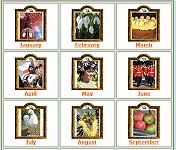
Folklore Calendar
stories, sayings, customs

Facts about May Gemstone: Emerald
|
|||
|
May is named after the Greek goddess, Maia. The month is a time of great celebrations in the northern hemisphere. It is the time when flowers emerge and crops begin to sprout. The Anglo-Saxon name for May was Tri-Milchi, in recognition of the fact that with the lush new grass cows could be milked three times a day. It was first called May in about 1430. Before then it was called Maius, Mayes, or Mai.
In Britain, as in most parts of Western Europe, May day marked the end of the harsh winter months, welcomed the beginning of Summer, and optimistically looked forward to the bright and productive months. For our ancestors, largely in rural areas, it was a major annual festival and was celebrated through out the country, especially on the first of May with music, dancing and games.
Traditional May Day celebrations included dancing around maypoles and the appearance of 'hobby horses' and characters such as 'Robin Hood' and 'Jack in Green'. Find out more about May Day in England In some parts of Britain, May 1st is called Garland Day.
Greenery was collected by primary school children to make garlands. In many English villages children would parade with garlands of flowers, sometimes fastened to sticks or in the shape of a cross, or fixed to hoops. This was done in the hope of collecting money. Sometimes this was known as May Dolling because often placed in the centre of the garland was a small doll. There are still garland ceremonies today. At Charlton-on-Otmoor, Oxfordshire, a large wooden cross covered with yew and box leaves stands above the rood screen in the church. On May Day this is taken down and redecorated with fresh greenery and flowers and the children carry small decorated crosses around the village and bring them to a special service. Also in Oxfordshire at Brampton, the Spring Bank Holiday marks the beginning of the traditional Morris Dance Season. In the morning children bring out a selection of garlands which are judged in a competition at lunch time. May dolls are sometimes used in these. May Day Superstition First thing in the morning on May 1st, young girls used to rush out into the garden to wash their faces in the May dew. Why?
The month of may was considered an unlucky month particularly for getting married. 'Marry in May and you'll rue the day'
This is the day that traditionally people wear oak apples or oak leaves pinned to them to remember that on May 29th King Charles ll returned triumphantly to London after the restoration of the monarchy in 1660.
The reason for the wearing of oak apples or oak leaves was to celebrate the King's narrow escape from capture by Cromwell's soldiers by hiding in an oak tree. Until well into the twentieth century, anyone caught not wearing an oak leaf or oak apple on 29 May could be pinched, kicked, or otherwise abused. Whipping with nettles was a favourite punishment, hence the name 'Nettle Day' in some areas. Read more about Oak Apple Day and Pinch-Bum Day here
Arbor Day, on the last Sunday in May, is the Sunday nearest to Oak Apple Day. In Aston-on-Clun in Shropshire, a large tree standing in the centre of the village is decorated with flags on the last Sunday in May. The flags stay on the tree until the following May. Aston-on-Clun is the only place in the UK that still marks this ancient tradition. People say that in 1786 the local landowner John Marston married on May 29th and, when passing through the village, saw the villagers celebrating Arbor Day. The bride thought that the tree looked so beautiful covered in flags, that she gave money to the village to allow the custom to continue.
1st May -Labour Day 1st May- May Day. 5th May - 1930 Amy Johnson was the first woman to fly solo from England to Australia. 6th May- 1840 The world's first postage stamp, the 'Penny Black' stamp, became valid for use in the UK. 8th May - 1945 VE (Victory in Europe) Day. 9th May Captain Blood attempted to steal the crown jewels in 1671 10th May- 1994 Nelson Mandela became the President of South Africa. 12th May- 1820 Florence Nightingale was born. 15th May The Romans believed this was the birthday of Mercury, the messenger and son of Zeus who could travel with the speed of thought. 18th May - 1955 The first Wimpy Bar opened in London. Have a treat and
visit your local Wimpy, or have a burger night. 21st May - 1946 Bread rationing introduced in the UK. 29th May - 1953 Edmund Hillary and Tenzing Norgay reached the summit of Everest. 29th May Oak Apple Day. 30th May 1431 Joan of Arc was burned at the stake. Jan | Feb | Mar | Apr | May | Jun | Jul | Aug | Sept | Oct | Nov | Dec |
|||
 © Copyright - please read © Copyright - please read All the materials on these pages are free for homework and classroom use only. You may not redistribute, sell or place the content of this page on any other website or blog without written permission from the Mandy Barrow. |
© Copyright Mandy Barrow 2013
Mandy is the creator of the Woodlands Resources section of the Woodlands Junior website.
The two websites projectbritain.com and primaryhomeworkhelp.co.uk are the new homes for the Woodlands Resources.
Mandy left Woodlands in 2003 to work in Kent schools as an ICT Consulatant.
She now teaches computers at The Granville School and St. John's Primary School in Sevenoaks Kent.
Woodlands Junior Homework Help new website
 May
Day (Garland Day)
May
Day (Garland Day)






